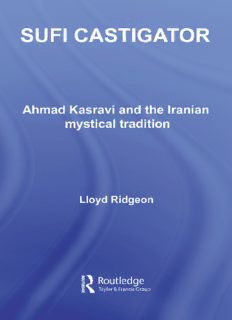
Sufi Castigator: Ahmad Kasravi and the Iranian Mystical Tradition PDF
Preview Sufi Castigator: Ahmad Kasravi and the Iranian Mystical Tradition
SUFI CASTIGATOR Sufi Castigator investigates the writings of Ahmad Kasravi who was one of the foremost intellectuals in Iran.It studies his work within the context of Sufism in modern Iran and mystical Persian literature and includes translations of Kasravi’s writings. Kasravi provides a fascinating topic for those with interests in Sufism and Iranian studies as he attempted to produce a form of Iranian identity that he believed was compatible with the modern age and Iranian nationalism.His stress on reason and the demystification of religion caused him to repudiate Sufism and much of the Sufi literary heritage as backwards and believe it a reason for the weakness of modern Iran. Kasravi’s historical observations were weak, and his writings indicate that he was working towards pre-determined conclusions. However, his works are of significance because they contributed to a major discussion in the 1930s–40s about the ideal image and identity that Iranians should adopt. Despite the academic weaknesses of Kasravi’s works, he had a profound effect on the next generation of thinkers. Sufi Castigator is a stimulating and meticulously researched book and includes two lengthy translations of Kasravi’s works,SufismandWhat does Hafez Say?,and will appeal to scholars of Middle Eastern studies. Lloyd Ridgeonis senior lecturer in Islamic Studies at the University of Glasgow. His research interests include Sufism, Islamic theology and history, modern Iranian politics and culture and Iranian cinema and literature. He is the author of Aziz Nasafi, and he has recently edited a reader entitled Religion and Politics in Modern Iran. ROUTLEDGE SUFI SERIES Series editor: Ian Richard Netton Professor of Arabic Studies University of Leeds The Routledge Sufi series provides short introductions to a variety of facets of the subject, which are accessible both to the general reader and the student andscholar in the field.Each book will be either a synthesis of existing knowledge or a distinct contribution to, and extension of, knowledge of the particular topic. The two major underlying principles of the series are sound scholarship and readability. 1.BEYOND FAITH AND INFIDELITY The Sufi poetry and teaching of Mahmud Shabistari Leonard Lewisham 2.AL-HALLAJ Herbert W.Mason 3.RUZBIHAN BAQLI Mysticism and the rhetoric of sainthood in Persian Sufism Carl W.Ernst 4.ABDULLAH ANSARI OF HERAT An early Sufi master A.G.Ravan Farhadi 5.THE CONCEPT OF SAINTHOOD IN EARLY ISLAMIC MYSTICISM Bernd Radtke and John O’Kane 6.SUHRAWARDI AND THE SCHOOL OF ILLUMINATION Mehdi Amin Razavi 7.PERSIAN SUFI POETRY An introduction to the mystical use of classical poems J.T.P.de Bruijn 8.AZIZ NASAFI Lloyd Ridgeon 9.SUFIS AND ANTI-SUFIS The defence,rethinking and rejection of Sufism in the modern world Elizabeth Sirriyeh 10.REVELATION, INTELLECTUAL INTUITION AND REASON IN THE PHILOSOPHY OF MULLA SADRA An analysis of the al-hikmah al-‘arshiyyah Zailan Moris 11.DIVINE LOVE IN ISLAMIC MYSTICISM The teachings of al-Ghâzalî and al-Dabbâgh Binyamin Abrahamov 12.STRIVING FOR DIVINE UNION Spiritual exercises for Suhrawardi Sufis Qamar-ul Huda 13.A PSYCHOLOGY OF EARLY SUFI SAMA Listening and altered states Kenneth S.Avery 14.MUSLIM SAINTS OF SOUTH ASIA The eleventh to fifteenth centuries Anna Suvorova 15.SUFI VISIONARY OF OTTOMAN DAMASCUS ‘Abd al-Ghani al-Nabulusi,1941–1731 Elizabeth Sirriyeh 16.SUFI RITUAL The parallel universe Ian Richard Netton 17.EARLY MYSTICS IN TURKISH LITERATURE Mehmed Fuad Koprulu Translated,edited and with an introduction by Gary Leiser & Robert Dankoff 18.INDIAN SUFISM SINCE THE SEVENTEENTH CENTURY Saints,books and empires in the Muslim deccan Nile Green 19.SUFI CASTIGATOR Ahmad Kasravi and the Iranian mystical tradition Lloyd Ridgeon Ahmad Kasravi SUFI CASTIGATOR Ahmad Kasravi and the Iranian mystical tradition Lloyd Ridgeon First published 2006 by Routledge 2 Park Square,Milton Park,Abingdon,Oxon OX14 4RN Simultaneously published in the USA and Canada by Routledge 270 Madison Ave,New York,NY 10016 Routledge is an imprint of the Taylor & Francis Group,an informa business © 2006 Lloyd Ridgeon This edition published in the Taylor & Francis e-Library, 2006. “To purchase your own copy of this or any of Taylor & Francis or Routledge’s collection of thousands of eBooks please go to www.eBookstore.tandf.co.uk.” All rights reserved.No part of this book may be reprinted or reproduced or utilised in any form or by any electronic,mechanical, or other means,now known or hereafter invented,including photocopying and recording,or in any information storage or retrieval system,without permission in writing from the publishers. British Library Cataloguing in Publication Data A catalogue record for this book is available from the British Library Library of Congress Cataloging in Publication Data A catalog record for this book has been requested ISBN10:0–415–31635–9 (hbk) ISBN10:0–203–57194–0 (ebk) ISBN13:978–0–415–31635–4 (hbk) ISBN13:978–0–203–57194–1 (ebk) FOR JESSICA, WITH LOVE AND GRATITUDE FOR SO MUCH CONTENTS List of figures x Acknowledgements xi 1 The background 1 2 Opinions of Sufism in Iran,1850–1950 13 3 Scourge of the Sufis:Kasravi’s rejection of Persian mysticism 45 4 “Sufism” 65 5 Opposition to the orientalists:Kasravi’s criticisms of E.G.Browne 121 6 Hostility to Hafez:Kasravi’s views of Persian poetry 137 7 “What does Hafez Say?” 160 Conclusion 191 Notes 195 Select bibliography 232 Index 240 ix
Description: